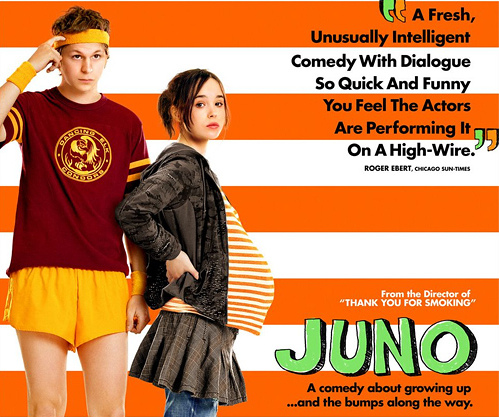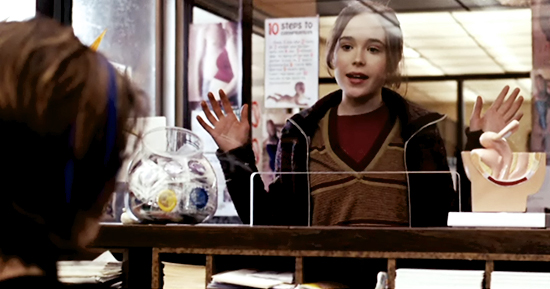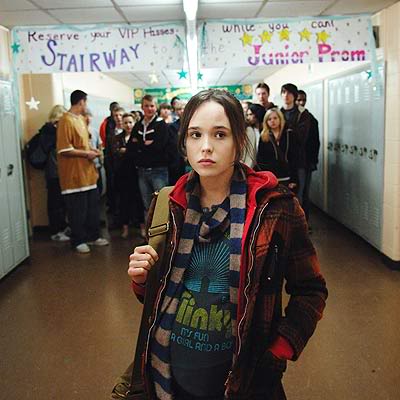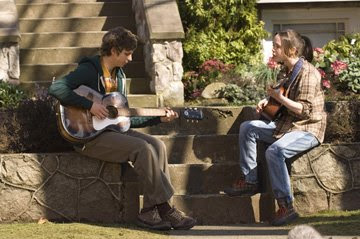 |
| Juno |
This is a guest post by Gretchen Sisson.
When it comes to abortion,
Juno is one film all sides of the debate have alternately claimed as their own and picked apart. Screenwriter Diablo Cody managed to earn both points and critics across the political spectrum with her story of a sarcastic, scrappy, pregnant high school student who, after an ill-fated visit to a creepy clinic ends up deciding on adoption, choosing adoptive parents and advocating for closed adoption, giving birth, and blissfully walking away.
Anti-choice activist Jill Stanek declares Juno “the movie pro-aborts will hate,” describing the film’s scene at the abortion “mill” as “hysterical” and the protestor outside the clinic as a “friendly” student with whom Juno engages in “civil conversation.”
In contrast, there are those who argue that by virtue of the film being about Juno’s decision, it is inherently in favor of choice. Pro-choice writer Emily Douglas writes that she enjoys the way Juno normalizes teen sexual activity and, while still describing it as a “suburban fairy tale,” also suggests that “It’s a film for the people who love the many imperfect ways families take shape and people grow up.” Even Ellen Page, the actress who played the title character, proclaimed her own pro-choice credentials: “I don’t want white dudes in an office being able to make laws on things like this.”
There are other issues, of course. Sociologist Arthur Shostak neatly summarizes the movie’s many shortcomings from a pro-choice perspective: an empty parking lot at the clinic, a single, non-threatening protestor outside, an unprofessional over-sharer for a receptionist. Additionally, I have previously written about the many problems I see with Juno’s depiction of adoption. When Juno asks for an “old-school, closed adoption” and the potential adoptive parents readily agree, no one is recognizing the fact that openness in adoption has long-term benefits for not only birth parents, but also adoptees and adoptive families; when Juno rides her bike off into the sunset, she is indeed perpetuating the anti-choice fairy tale that adoption is without grief or long-term consequence of any kind.
The scene at the abortion clinic is an unequivocal disaster; the adoption story is messy and unrealistic; the happy ending is too easy, too over simplistic, too sweet for our sassy heroine.
So why, as feminists, do so many of us love this film in spite of all that?
I view the film as seeing the world through Juno’s eyes. It’s a cartoonesque version of reality, where people talk a bit like Juno and not quite like they do in real life, where characters are parodies and caricatures of stock types, and where there’s a teenager’s desire for what’s right and wrong to be obvious in a messy situation.
 |
| Juno at the abortion clinic |
The abortion clinic scene, then, is an inaccurate, hyperbolic reflection of how someone who doesn’t want to have an abortion might feel as they arrive at their appointment: confused, intruded upon, looking for an excuse to run toward the door. I don’t believe it’s the way we see the clinic that makes Juno not want an abortion, I think Juno doesn’t want an abortion, and that makes her (and the viewer) see the clinic differently. Perhaps this is a generous interpretation, and perhaps the problems that derive from a false portrayal of a clinic outweigh the possible benefits of exploring Juno’s choice from her own perspective. But the fact that Juno doesn’t really want an abortion before she even arrives at the clinic is what’s most important. She says she’ll “nip it in the bud” when Paulie Bleeker (the baby’s father) seems overwhelmed by the news; she makes an appointment to “procure a hasty abortion” because she, like the high schooler she is, wants a solution
fast and this seems to be the prescribed way of handling it. For many high schoolers it may be, and they may quickly know that abortion is the right decision for them. But for Juno it doesn’t sit right, which is why the inaccurate information about heartbeats and fetal pain and fingernails, resonate with her. She wants to give birth, even though she’s scared and even though she knows she’ll be judged, which is why she finds the clinic so alienating. How nice it would have been if the clinic had been portrayed as a welcoming place where she could discuss her options, and get information about a reputable adoption agency that would give her ongoing support throughout the adoption process. The representation is very far from perfect. However, if we view our perspective as coming through the position of an overwhelmed teenager, perhaps we can still find much to salvage about the film’s take on reproductive choice.
Because, in many ways, Juno is a heroine for choice. Her independence is impressive – she doesn’t consult her parents until she’s already made her choice, decided against abortion, found adoptive parents, and arranged a time to meet with them. She makes the plans on her own and then tells them she’s looking for their support (which she receives) but not their permission. For a young woman, that’s exceptionally self-aware and downright empowered.
 |
| Juno in high school |
She also doesn’t let herself be shamed by her pregnancy. When the ultrasound tech describes young mothers as raising their children in a “poisonous environment” Juno defends herself, with brilliant back up from both her friend and stepmother, who snaps one of my favorite lines in the movie: “Maybe they’ll do a far shittier job of raising a kid than my dumbass stepdaughter ever would.” Later, she jokes about her classmates’ looks, and, in the middle of a fight, reminds Paulie that she unfairly has to live with the stares and judgment while he does not. She recognizes the injustice of others’ scorn and refuses to let it impact her; though a brief moment of tears shows how truly unfair it is. And when her father, in between moments of sincere and endearing support, utters the cutting line, “I thought you were the kind of girl who knew when to say when” she responds without pause, “I have no idea what kind of girl I am.” And that’s the point – she doesn’t need to. She’s sixteen years old. She’s allowed to still be figuring out who she is and what she wants.
 |
| Juno and Paulie |
In between the hard decisions, quick comebacks, and fierce strength, Juno should still be allowed moments of vulnerability, (or even the gullibility that she shows outside the abortion clinic). And she should deserve the hopeful ending she believes she gets, even if we might think it’s only a brief reprieve or an unrealistic happily ever after. Navigating reproductive choice isn’t easy, even for people for whom the choice is clear, because of all the cultural baggage heaped upon every action. This is why every side will claim Juno as their heroine, and why I think – fictitious and problematic though it may be – Juno should have her happy ending. Because it can give us hope that, at some point in the future, her real-life counterparts might find happy endings as well, no matter what they choose.
———-
Gretchen Sisson is a sociologist and writer whose work focuses on reproductive justice broadly and teen pregnancy, young parenthood, adoption, abortion, birth, and infertility specifically. You can find her on Twitter @gesisson.





hmmm this is a great piece, and i do agre this is pro choice. but, despite what your beliefs are, the film really does capture some great realistic moments in teen pregnancy. and you can smell and diablo cody character from a mile away, and i always appreciated that. i do believe she’s a feminist–a true feminist, with flaws.